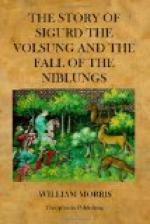Now amidst those days that
she pondered came a wife of the
witch-folk there,
A woman young and lovesome,
and shaped exceeding fair,
And she spake with Signy the
Queen, and told her of deeds of her craft,
And how the might was with
her her soul from her body to waft
And to take the shape of another
and give her fashion in turn.
Fierce then in the heart of
Signy a sudden flame ’gan burn,
And the eyes of her soul saw
all things, like the blind, whom the
world’s
last fire
Hath healed in one passing
moment ’twixt his death and his desire.
And she thought: “Alone
I will bear it; alone I will take the crime;
On me alone be the shaming,
and the cry of the coming time.
Yea, and he for the life is
fated and the help of many a folk,
And I for the death and the
rest, and deliverance from the yoke.”
Then wan as the midnight moon
she answered the woman and spake:
“Thou art come to the
Goth-queen’s dwelling, wilt thou do so much
for my sake,
And for many a pound of silver
and for rings of the ruddy gold,
As to change thy body for
mine ere the night is waxen old?”
Nought the witch-wife fair
gainsaid it, and they went to the bower
aloft
And hand in hand and alone
they sung the spell-song soft:
Till Signy looked on her guest,
and lo, the face of a queen
With the steadfast eyes of
grey, that so many a grief had seen:
But the guest held forth a
mirror, and Signy shrank aback
From the laughing lips and
the eyes, and the hair of crispy black,
But though she shuddered and
sickened, the false face changed no whit;
But ruddy and white it blossomed
and the smiles played over it;
And the hands were ready to
cling, and beckoning lamps were the eyes,
And the light feet longed
for the dance, and the lips for laughter
and lies.
So that eve in the mid-hall’s
high-seat was the shape of Signy the
Queen,
While swiftly the feet of
the witch-wife brushed over the moonlit
green,
But the soul mid the gleam
of the torches, her thought was of gain
and of gold;
And the soul of the wind-driven
woman, swift-foot in the moonlight
cold,
Her thoughts were of men’s
lives’ changing, and the uttermost ending
of earth,
And the day when death should
be dead, and the new sun’s nightless
birth.
Men say that about that midnight
King Sigmund wakened and heard
The voice of a soft-speeched
woman, shrill-sweet as a dawning bird;
So he rose, and a woman indeed
he saw by the door of the cave
With her raiment wet to her
midmost, as though with the river-wave:
And he cried: “What
wilt thou, what wilt thou? be thou womankind or
fay,
Here is no good abiding, wend
forth upon thy way!”




